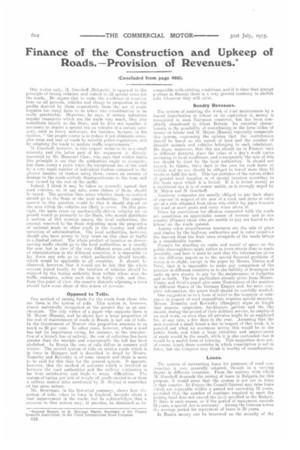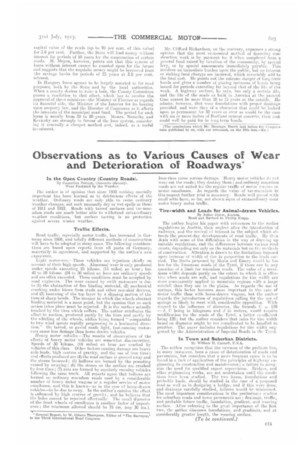Finance of the Construction and Upkeep of Roads.—Provision of Revenues.*
Page 16

Page 17

If you've noticed an error in this article please click here to report it so we can fix it.
Concluded from page 466).
One writer only, M. Guechoff (Bulgaria), is oppossd Is the principle of taxing vehicles, and indeed to all special taxes for the roads. He argues that to make the Mcideuce of taxation bear on all persons, vehicles and things in proportion to the profits derived by them respectively from the use of roads requires too many facts to be taken into consideration to be really practicable. Moreover, he says, if certain industries require transports which use the roads very much, they also contribute largely to the State, and he does not consider it necessary to impose a special tax on vehicles of a certain category, such as heavy motorcars, for iustance, because, in his opinion, " the proper course is to reduce if not eliminate excessive wear and tear of roads by suitable police regulations, and by adapting the roads to modern traffic. requirements." Guechoff, however, in this respect seems to be in it small minority and the latter part of his argument is directly answered by Mr, Harcourt Clare, who says that within limits this principle is one that the authorities ought to recognize, but there comes a point when the exceptional use it the road by a very small number id individual traders compared to the greater nernbee of traders using them, causes an amount. of damage to the roads entirely dispmportionate to the wear and tear raeeed by the rest of the traffic.
Indeed, I think it may be taken as generally agreed that road vehicles, or, at any rate, some classes of them, sheuld be taxed. The question then arises whether funds so.realizrd should go to the State or the local authorities. The simplest answer to this question would he that it should depend en the area which the vehicles are likely to cover. On this principle, the main taxes on mechanically-driven vehicles or en petrol) would go primarily to the State, who should distribute a portion of this revenue among the local authorities, the amount reserved to the State depending upon the proportion of national roads to other roads in the country and other questions of administration. The local authorities, however, should also have power to levy taxes on this class of traffic to a limited extent. The whole product of taxation on slowermoving traffic should go to the local authorities, as is usually the Mae but in view of the very different areas and systems of administration in the different countries, it is impossible to lay down any rule as to which authorities should benefit, which would be applicable to all countries. It should be observed, however, that it would not be fair that the whole revenne raised locally by the taxatioa of vehicles should be enjoyed by the taxing authority from within whose area the traffic emanates, unless such area is fairly wide, and that, from this point of view, the country districts adjoining a town should have some share of this source of revenue.
Opposed to Tolls.
One method of raising funds for the roads front those who use them is the system of tolls. This system is, however, almost universally recognized at the present day as an anachronism. The only writer of a paper who supports them is
Meyen (Russia), and he shows how a large proportion of the cosi, of maintenance of roads in Russia is met out of tolls. In the Government of Moscow this proportion amounts to as much as 50 per cent. In other cases, however, where a read has lost, its importance owing, for instance, to ; the introduction of a branch line of railway, the cost of collection has been greater than the receipts and consequently the toll has been abolished. In Russia the rate of tells differs in summer end winter. The special system of tolls on station roads which is in force in Hungary and is described in detail by Messes. Nemethy and Keviczky is of some interest and there is more to be said for this than for the general system. It appears, however, that the method of accounts which is involved as between the road authorities and the railway companies is far from satisfactory and leads to many di-ffieulties. The system of taxing per unit of weight all goods carried to or from a railway station (also mentioned by :M. Meyen) is somewhat of the same nature.
Mr. Berryman, in his historical summary, shows how the system of Colts. when in force in England, brought about vast improvement in the roads, but he acknowledges that a recoerse to that system may, in practice, be dismissed as in
compatible with existing conditions, and it is clear that (except in-diens in Russia) there is a very general tendency to abolish tolls wherever they still exist.
Sundry Revenues.
The system of assisting the work of road maintenance by a forced contribution in labour or its equivalent in money is recognized in most European countries, but has been completely abandoned in Great Britain. Its essential characteristic is the possibility of contributing in the form either of money or labour and M. Meyers (Russia) especially commends this system, expressing the, opinion that the centribution should be based on the extent of land and the number of draught animals and vehicles belonging to each inhabitant. He urges, moreover, that this tax should (rie in France) vary in different districts, since the value of a day's work varies acrording to local conditions, and consequently the rate of this tax should he fixed by the local authorities. It should not, eeceed, he thinks, three days in the year for each horse or vehicle and no one should he obliged to travel more than 15 versts to fulfil his task. This tax partakes of the maitre either of general local taxation or of special taxation according to the bests upon which it is levied. If it is levied merely as a capitation tax it is of course unfair, as is strongly urged by 31. Meyen and 31. Gukhoff.
.framway companies are usually obliged to pay their share of expense in respect of the user of a road, and rents or rates are as a rule obtained from those who either lay pipes beneath the road or erect posts and carry wires above it.
Fines for convictions for offences connected with the roads are sometimes an appreciable source of revenue and in one country (France) those who are unable to pay are kneed to do labour on the roads instead.
Among other miscellaneous resources are the sale of grass and timber by the highway authorities and in some countries the harvest from the fruit trees alongside of the roads brings in a considerable income.
Permits for standing on ranks ad rental of space on the public thoroughfares apply rather to town streets than to roads generally, and here it must be said that the information given in .tim different papers as to the special financial problems of towns is Co slight, except in the paper by Messrs. Timme and Petri, that it is impossible to make any comparison of the practice in different countries as to the. liability of frontagers to make up new streets, to pay for the maintenance of footpaths and so forth. The few particulars already given from Messrs. TiM1110 and Petri's paper give some illustrations of the position in different States of the German Empire and, for more complete information, the paper itself should be carefully studied, this suggestion as to a form of relief to the taxpayer or ratepayer in respect of road expenditure requires special mention. Messrs. Nernethy and Keviczky (Hungary) argue at length that masons, carpenters, bricklayers, parlors and the like should, during the period of their military service, be employed us road work, or even that all privates might be so employed for, at any rate, a few days in the year. Assuming that the men received a small bonus a day in respect of this work, it is pointed out what an enormous saving this would be to the public funds and what a large extension and improvement of roads would be the result, while. it is also contended ;hat, it would be a useful form of training. This suggestion does not, of course, touch those countries in which conscription is not in force, but the Congress may think it worthy of consideration.
Loans.
The system of contracting loans for purposes of road construction is very generally adopted, though in a varying degree in different countries. From the urgency with which 31. Guechoff demands the raising of loans in Bulgaria for this purpose, it would seem that the system is not yet in force in that country. In France the Conseil General may raise loans which are repayable within a periud not exceeding 15 years, provided that the number of centimes required to meet the sinking fund does not exceed the limit specified in the Budget. If there is such excess, or if the period of repayment exceeds 15 years, a special Act is necessary. Among the German towns the average period for repayment of loans is 30 years.
In Russia money can be borrowed on the security of the
capital value of the roads (up to 70 per cent, of this value) for 3.8 per cent. Further, the State will lend money tl ithou t interest for periods of 10 years for the construction of certain roads. AL aleyen, however, points out that this system of loans without interest cannot he counted upon for the future and suggests that the requisite money might he borrowed from the savings banks for periods of 25 years at 3.8 per cent. interest.
In Hungary loans appear to be largely resorted to for road purposes, both by the State and by the local authorities. When a county desires to raise a loan, the County Committee passes a resolution to that effect, which has to receive the approval of three ministers—the Alinister of Finance as regards its financial side, the Minister of the Interior for its bearing upon property law, and the Minister of Commerce as it affects the interests of the municipal road fund. The period for such loans is usually from 30 to 50 years. Messrs. Nemethy and Keviczky are strongly in favour of the loan system, cousider. ing it generally a cheaper method and, indeed, as a useful in vestment.
Mr. Clifford Richardson, on the contrary, expresses a strong opinion that the most economical method of tina»eing construction work is by payment for it when completed from a general fund raised by taxation of the community, by special levy, or by special assessments immediately payable. This involves an immediate burden upon the public, butno interest or sinking-fund charges are incurred, which invariably add to the final cost. He points out the extreme danger of lung-term bonds and gives a number of glaring instances of bonds being issued for periods extending far beyond that of the life of the work. A highway surface, he says, has only a certain rife, and the life of the roads as built in America at the present time cannot be more than 10 to 15 years at the outside. He admits, however, that were foundations with proper drainage provided, and were they of a character that could be looked upon as permanent for 50 years or over as would he the case with six or more inches of Portland eement concrete, their cost could well be paid for in long-term bonds.
[The conclusion which Mr. Montagu Harris laid before the Congress were published by us, with our comment, on the 10th inst.—E.I


























